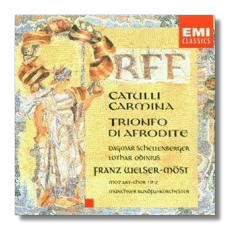
The Internet's Premier Classical Music Source
Related Links
- Orff Reviews
- Latest Reviews
- More Reviews
-
By Composer
-
Collections
DVD & Blu-ray
Books
Concert Reviews
Articles/Interviews
Software
Audio
Search Amazon
Recommended Links
Site News
 CD Review
CD Review
Carl Orff

- Catulli Carmina
- Trionfo di Afrodite
Dagmar Schellenberger (soprano), Lothar Odinius (tenor),
Lisa Larson (soprano), Robert Swensen (tenor), Alfred Reiter (bass),
Mozart-Chor Linz, Münchner Rundfunkorchester/Franz Welser-Möst
EMI Classics 55517
The one work that has kept Orff's name before the public, Carmina Burana represents a new beginning for Orff, and certain elements there he left for good. Orff has two main strains: a folk idiom and a much more austere one, usually reserved for classical texts. Carmina Burana belongs to the folky side, but the two other works which make up Trionfi – Catulli Carmina and Trionfo di Afrodite – lack the peasant-dance elements that contribute so much to Burana's popularity. They haven't been recorded all that much. I'm particularly fond of an old Ormandy recording of the Catulli Carmina, yet to make a reappearance on CD. In fact, that's really the only "celebrity" recording of either work I know of.
Orff wrote Carmina Burana with an amateur chorus in mind. However, Catulli and Trionfo demand a high-caliber choir. Indeed, both works tax a choir's stamina, and it's precisely the choir that disappoints, despite all that Welser-Möst can do to inject some excitement into the performance. The men do better than the women, but the women disappear in a wispy breathlessness and their tone doesn't sound mature enough. Men and women run into occasional rhythmic problems, particularly on the octave leaps strewn throughout the works. Often, they don't even reach the full octave. Basically, they run out of gas, particularly in the "Miser Catulle" section, the climax of the work. On the other hand, their diction is superb, and that's not nothing in a work whose rhythms are so closely tied to the words. I complain only that they use Church Latin pronunciation for the classical Latin poetry of Catullus. The harsher consonants and the diphthongs of classical Latin suit the music far better. I should also commend tenor Lothar Odinius for some incredible solo singing. His voice may not be Pavarotti-sized, but his taste and intelligence make a huge impact. And he's beautifully in tune, besides.
The chorus does better in Trionfo, but it's still underpowered, with the excitement again mainly coming from the orchestra and Welser-Möst. If the Catullus settings emphasize the chorus, Trionfo stresses the beauty inherent in a percussion ensemble. Orff draws from it not only plenty of power, but also the great delicacy of moonlight on the water. The choir usually sings in unison for long stretches, and the unison is a true unison – almost no spread in the pitch among the voices. However, they just seem emotionally out of it.
In short, this is neither the Catulli nor the Trionfo I've waited for, but at least it is available from a major label.
Copyright © 1996, Steve Schwartz


















